SUMMARY
This is AI generated summarization, which may have errors. For context, always refer to the full article.
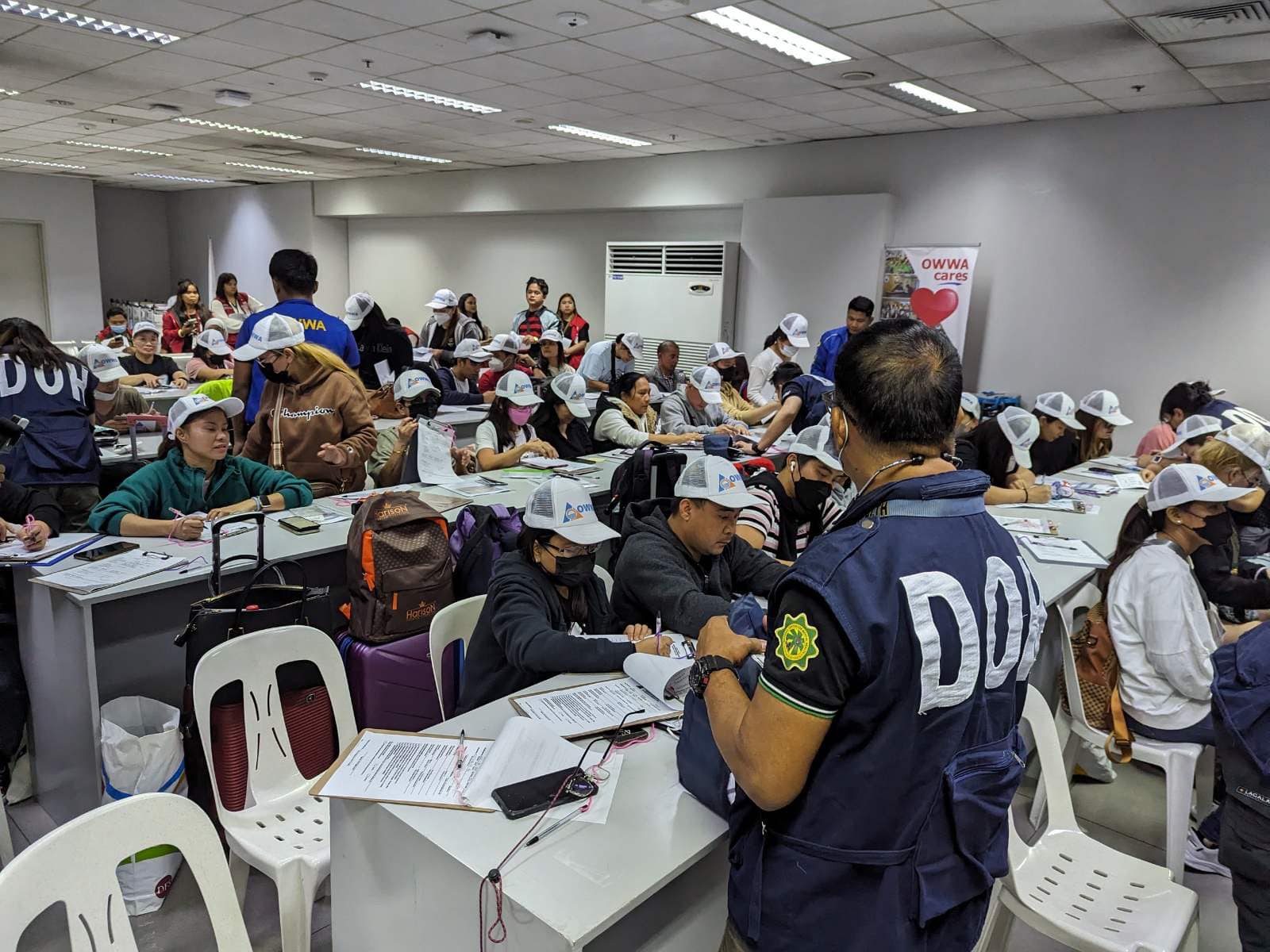
MANILA, Philippines – Physically, they were fine. But at least two Filipino hotel employees who worked in northern Israel were shaken as they told stories of mental distress they endured in their host country before coming home to the Philippines.
Jay Meniado and Ernesto Bergonio were part of the group of 60 overseas Filipino workers (OFWs) and two infants who arrived in Manila from Israel on Monday, October 30.
While clashes between Israel and Palestinian militant group Hamas have been concentrated in Gaza and southern Israel, the north also faces threats amid fears tensions would spill over into Lebanon, where Israel and the Iran-backed Hezbollah group have been exchanging fire.
The batch that arrived on Monday, composed of 32 hotel workers and 28 caregivers, is the fourth and largest batch of OFWs the Philippine government has repatriated to date since Hamas launched attacks in southern Israel on October 7. They bring the total number of repatriates so far to 119.
This is also the batch with a majority of hotel workers, with the first three consisting mostly of caregivers. Department of Migrant Workers (DMW) officer-in-charge (OIC) Hans Cacdac said that the department wanted to ensure the OFWs had proper separation from their employers should they wish to return to the country in the event the clashes settle down.
Apart from the DMW, various government agencies met the group at the Ninoy Aquino International Airport, including the Department of Foreign Affairs (DFA), the Department of Social Welfare and Development, the Department of Health, and the Technical Education And Skills Development Authority to provide various forms of assistance, from cash aid to livelihood assistance.
The DOH, for instance, assessed the OFWs’ physical and mental well-being. Health Emergency Management Bureau Director Bernadette Velasco reported that all 60 were physically well, but several OFWs who shared their stories with the media told stories of anxiety and uncertainty before going home.
Since October 7, Israel has intensified its assault on the Palestinian territory Gaza. At least four Filipinos have died in the conflict, while two are missing and presumed to be among the hundreds that Hamas has hostaged.
‘We were not ready’
Meniado had only been working in the northern city Tiberias for seven months when the intense October clashes happened, and it was his first time hearing sirens signaling them to take cover from missiles. For some time, he stayed put in his flat and his work, but any feelings of safety felt like they were only momentary.
“Hindi po kami ready noong panahon na ‘yun…. Kasi first time namin, hindi kami experienced [sa] ganoon na pangyayari,” Meniado told reporters. “Wala ring nagsabi sa amin kung ano ‘yung mga kailangan naming gawin, kung kaya’t kanya-kanya po talaga.”
(We were not ready at the time…. It was our first time, and we had not experienced these kinds of things. Nobody told us what we needed to do, so we had to find out on our own.)
Meniado said he developed “simple traumas” as he would easily startle or not be able to sleep peacefully.
“Makarinig lang ako ng tunog ng helicopters, ‘yung mga sasakyan po ng mga sundalo na nagpapatrolya sa buong Tiberias, iba na po ‘yung nararamdaman ko, hanggang sa naapektuhan po ‘yung pagtulog ko sa gabi. Hindi na po ako makatulog nang maayos dahil what if sa kasarapan ng tulog ko, biglang may missile na mapadpad doon sa flat namin?“
(As soon as I heard the sound of helicopters and the vehicles of soldiers patrolling Tiberias, I would feel uneasy. Eventually, my sleep was affected. I could no longer sleep well because what if I let myself sleep soundly and suddenly a missile hit our flat?)
No savings
Bergonio, who worked with Meniado, said he developed anxiety after hearing every day the sound of nearby bombs while at the hotel that Philippine authorities designated him in Tel Aviv.
“‘Yung nanay ko po…part po siya [ng] pangarap ko bilang isang OFW. Five years po ‘yung contract na pinirmahan namin. So 11 months pa lang po ako doon, wala pa po akong naipon, and marami pong bayarin. Pero ang sabi po ng nanay ko is safety first, kaya nag-decide din na po akong umuwi,” said Bergonio.
(My mother is part of my dream as an OFW. I signed a contract for five years. But I was only there for 11 months, I was not able to save up anything, and I have lots of things to pay for. But my mother said safety came first, which is why I decided to go home.)
In a separate interview with Rappler, 36-year-old Bergonio described his closeness with his mother as all they had in the Philippines was each other since his only sibling already has a family of his own. The land he and his mother tilled did not always earn them enough money.
He decided to go abroad to better support his mother. It was his first time to work in a different country.
“I heard a lot of stories of bombing. In the first quarter of the year that I was there, there was already bombing, but it wasn’t that bad, unlike now,” he said in a mix of English and Filipino.
Bergonio said he was told by government representatives that they would help him find work in a safer country.

DMW OIC Cacdac said there were still 250 requests for repatriation (and counting) from Israel. Meanwhile, DFA Undersecretary Eduardo de Vega, who handles migrant workers affairs, said that in the Gaza Strip, 115 of the 136 Filipinos there have been confirmed alive and uninjured. The DFA is working on reaching the remaining 21.
The Philippines is among many countries that have called for the opening of a humanitarian corridor that would allow foreign nationals to exit Gaza, administered by Hamas but whose borders are controlled by Israel. A resolution to the plea has yet to be made. – Rappler.com
Add a comment
How does this make you feel?
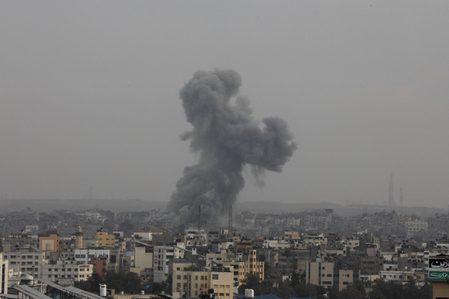









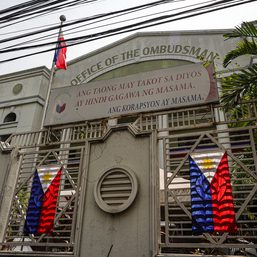

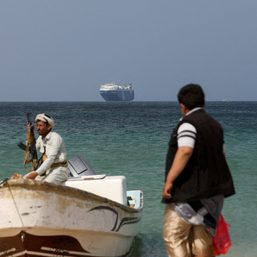





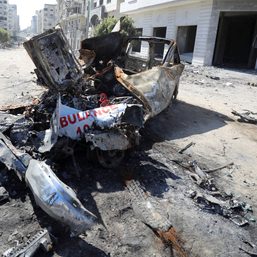




![[OPINION] LGBT, mental health, and why Pride March is there](https://www.rappler.com/tachyon/2024/06/lgbt-mental-health-june-11-2024.jpg?resize=257%2C257&crop_strategy=attention)
![[Free to disagree] Ending victimhood](https://www.rappler.com/tachyon/2024/05/TL-Ending-victimhood-May-20-2024.jpg?resize=257%2C257&crop_strategy=attention)

![[Two Pronged] I think I’m bipolar – can I handle it without medication?](https://www.rappler.com/tachyon/2024/03/two-pronged-BiPolar-Disorder-without-meds.jpg?resize=257%2C257&crop=250px%2C0px%2C720px%2C720px)

There are no comments yet. Add your comment to start the conversation.